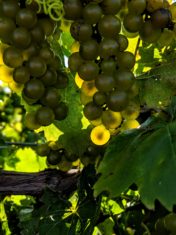How the Purdue Wine Grape team is introducing new grape varieties and fighting damaging pathogens
These are just some of the new grape varieties the Purdue Wine Grape Team cultivates at the Throckmorton/Meigs Purdue Agricultural Center. They grow roughly 70 varieties, which horticulture professor Bruce Bordelon says just scratches the surface of all the different grapes. The Wine Grape Team grows grape plots for evaluation (they make their own wine!) as well as for research purposes.
The Crimson Pearl and Verona red grapes were recently developed by a Minnesota breeder to withstand cool climates. Right now, Bordelon says Throckmorton/Meigs is the only place in Indiana growing the varieties. He’s hoping to monitor their growth so they might be introduced to vineyards around the state, especially in northern Indiana.

Tuesday, August 28, 2018.
“These are very cold-hardy and potentially good wine quality grapes,” Bordelon adds. “We’ll know more when the trials are done.”
Grapes are one of Indiana’s more temperamental specialty crops, susceptible to birds, insects, and a variety of pathogens, Katie Barnett, wine grape marketing Extension specialist says.
Bordelon says aside from an abundance of Japanese Beetles and a bit too much rain, this has been a decent growing year for grapes, aided largely by the warm weather early in the season. He recently discovered ripe rot, however, a disease caused by a fungal pathogen, which infects grapes late in the growing season, when they are mature. More common out East, Bordelon adds more farmers are seeing it this season in Indiana, likely as they increase their varieties and plant crops that are more susceptible.






